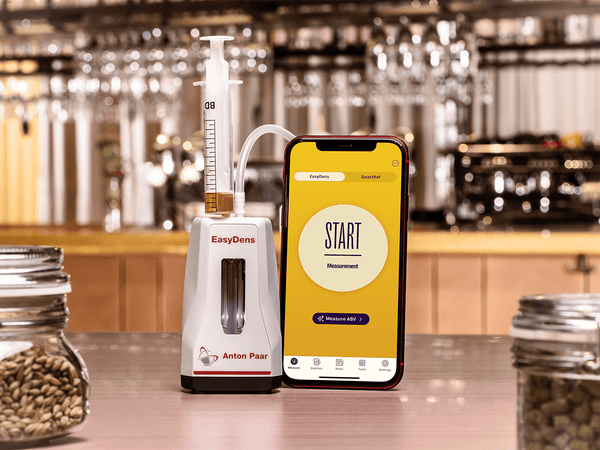
For your signature beer
EASYDENS BEER HYDROMETER | BREW MEISTER MOBILE APP
Brewing your own beer - with a unique taste - requires the use of high-quality components as well as precise and reliable measurement instruments. The EasyDens beer hydrometer and the Brew Meister mobile app for iOS and Android make measuring the extract content of your wort and tracking the fermentation process simple and highly accurate.
Brew Meister takes care of all the necessary calculations for you, so you can fully concentrate on brewing the beer.

With a small sample volume of only 2 mL EasyDens and the Brew Meister app deliver highly precise results with Automatic Temperature Compensation (ATC):
- Plato [°P]
- Specific Gravity [SG 20/20]
- Specific Gravity [SG] at current temp.
- Est. ABV [%v/v] (based on OG & FG)
- Density [g/cm³] at current temp.
- Temperature [°C], [°F]

Save up to -10% with our Homebrewer's Kit Deal
- Extract content of wort
- Fermentation tracking
- Precise alcohol content (± 0.5 %v/v)
- Additional equipment
EasyDens Beer Hydrometer for your beer brewing process
Water, grain, yeast, and hops are the four primary elements used in beer brewing. Because there is such a wide range of options, there are numerous methods to create your own handcrafted beer.
Allow the EasyDens beer hydrometer to be your intelligent little helper throughout this procedure so you can focus on being creative with brewing and discovering your own brewing style.
Take density measurement readings with EasyDens and the Brew Meister mobile app at every step of the beer brewing process:
Mash complete gravity reading
Pre-boil gravity
Post-boil gravity
Original gravity | original extract
Fermentation gravity readings
Final gravity | apparent extract
Once the raw materials are prepared, the milled malt is mixed with hot water in the mash tun. Fermentable sugars are extracted from grain starches and concentrated, which is then called the wort. Take your first gravity measurements to check if everything worked well during the mashing process and calculate the number of fermentable sugars produced. This is an indicator of enzyme efficiency and quality of the mash extract.
After mashing, the wort is filtered in the lauter tun or with a mash filter in order to separate the solids from the liquids. To extract the residual sugars during sparging, the mashed grains are rinsed with brewing water. Following this process, it is important to keep track of the wort concentration. This information is crucial for all further steps during the brewing process.
Next, hops are added to the wort to give your beer its unique aroma, bitterness, and flavors. The number and type of hops you use will determine the final taste of your beer. The wort is then boiled in the kettle. Malt enzymes are deactivated in this stage, and undesired volatile aromas such as proteins and tannins are removed. The wort is concentrated to the original wort as the water level decreases during evaporation. When the boiling process is finished the wort is transferred into a whirlpool and left to rotate. The trub (remaining proteins and hops) is held back, and the clear wort can be poured out.

Then the wort is cooled to a temperature between 15 °C and 20 °C. Before fermentation begins, the wort concentration (Density, °Plato, SG) is measured to calculate the original gravity. The result also offers you a rough estimate of how much alcohol will be in your beer at the end.
By adding yeast, the wort is finally transformed into beer. The yeast turns the malt sugars into alcohol and CO₂.

Every brewer understands the importance of losing as little beer as possible throughout the brewing process. EasyDens only needs 2 mL of your brew to quickly determine the wort concentration. With the knowledge of the original gravity (SG before fermentation) and the final gravity (SG measurement during/after fermentation), an estimation of the alcohol content %v/v is automatically calculated in the batch.
Three different ABV calculations from original gravity and final gravity are available in the app:
- Hubert Hanghofer Formula
- Standard Formula
- Alternative Formula
You can choose your favorite. This allows you to monitor how well the fermentation is going and how much alcohol has already been produced in order to maintain constant control and quality of your beverage. The values of your beer are easily recorded and collected in batches in the Brew Meister app. The fermentation curve is also displayed graphically over time.
Fermentation takes about 7 to 14 days to complete. Then the beer will go through a second fermentation in a storage tank, to develop its distinct colour, CO₂ content, and clearance. After that, depending on whether you want a clear or cloudy outcome, the beer can be filtered. Before being bottled, the beer is aged for two to three weeks at low temperatures.
When your beer is ready-to-drink, we recommend precisely determining the ABV directly with a combined measurement of EasyDens Digital Density Meter and SmartRef Digital Refractometer. The use of both measuring technologies can quickly and accurately measure the alcohol content in finished beer. (Learn more…) Additionally, you get results for original gravity and real extract in seconds.
Finally, you can enjoy your handcrafted beer!

Homebrewing guide
Brewing beer has a very precise and calculated aspect to it and at the same time it is wildly artistic - giving you space for your own creativity in finding your unique beer brewing style and character.
With this step-by-step homebrewing guide you will learn what it takes to create and enjoy your own handcrafted beer.










